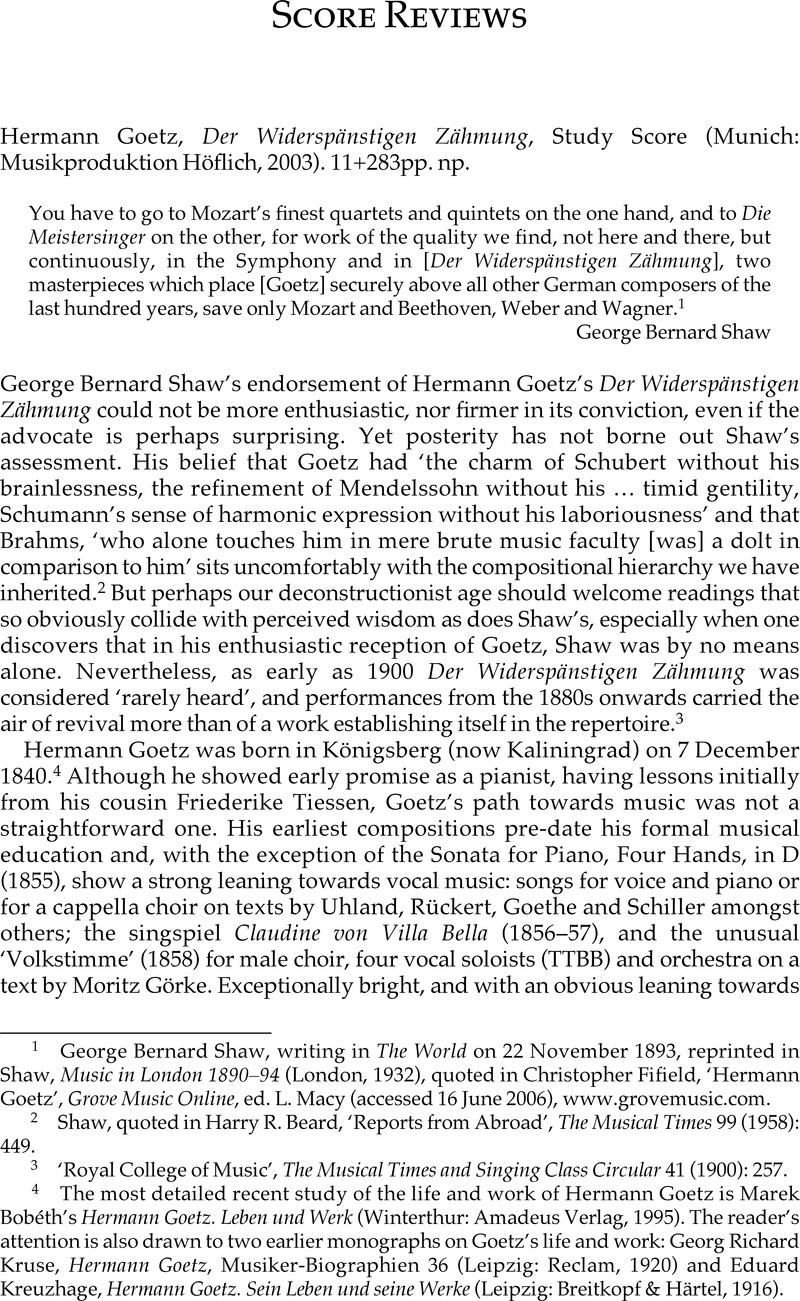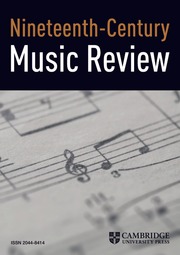No CrossRef data available.
Article contents
Hermann Goetz, Der Widerspänstigen Zähmung, Study Score (Munich: Musikproduktion Höflich, 2003). 11+283pp. np.
Published online by Cambridge University Press: 13 April 2011
Abstract

- Type
- Score Reviews
- Information
- Copyright
- Copyright © Cambridge University Press 2007
References
1 Shaw, George Bernard, writing in The World on 22 November 1893, reprinted in Shaw, Music in London 1890–94 (London, 1932)Google Scholar , quoted in Christopher Fifield, ‘Hermann Goetz’, Grove Music Online, ed. L. Macy (accessed 16 June 2006), www.grovemusic.com.
2 Shaw, quoted in Beard, Harry R., ‘Reports from Abroad’, The Musical Times 99 (1958): 449Google Scholar.
3 ‘Royal College of Music’, The Musical Times and Singing Class Circular 41 (1900): 257.Google Scholar
4 The most detailed recent study of the life and work of Hermann Goetz is Bobéth's, MarekHermann Goetz. Leben und Werk (Winterthur: Amadeus Verlag, 1995)Google Scholar . The reader's attention is also drawn to two earlier monographs on Goetz's life and work: Richard, GeorgKruse, Hermann Goetz, Musiker-Biographien 36 (Leipzig: Reclam, 1920) andGoogle ScholarKreuzhage, Eduard, Goetz, Hermann. Sein Leben und seine Werke (Leipzig: Breitkopf & Härtel, 1916)Google Scholar.
5 Goetz was noted as being an extremely bright, thoughtful and dedicated student; see Jensen, Eric Frederick, Walls of Circumstance: Studies in Nineteenth-Century Music (New York: Scarecrow Press, 1992): 104Google Scholar.
6 Goetz attended the Stern Academy from October 1860 to April 1862. It is perhaps no coincidence that the beginning of his studies at Berlin coincides with a marked shift in his compositional activity. Songs give way to two fugues for string quartet (G minor, 1860; F major, 1861), a Fantasie for solo piano (1861), and a one-movement Piano Concerto in Eb (1861).
7 Jensen, , Walls of Circumstance: 105Google Scholar . Goetz also established a singing association, ‘Melodia’, and continued giving piano lessons: Näf, Lukas, ‘Hermann Goetz’, Musinfo (accessed 16 June 2006)Google Scholar , www.musinfo.ch/index.php?content=maske_personen& pers_id=251.
8 Goetz had met Laura Wirth in 1865 and they had married in September 1868. A daughter was born in 1869.
9 Jensen, , Walls of Circumstance: 105.Google Scholar
10 It should be noted that sometimes Goetz's opera is referred to using the new German spelling of Der Widerspenstigen Zähmung. I use the original spelling throughout.
11 Fifield, ‘Hermann Goetz’. The two men had met through the group ‘Academia’ (Näf, ‘Hermann Goetz’: 2) and had previously collaborated on the Singspiel Die heiligen drei Könige, written for performance on Twelfth Night in 1866 (Fifield, ‘Hermann Goetz’).
12 Christoph Schlüren describes the collaboration of Widmann and Goetz as ‘perhaps second to none in opera history for its intensity, thoughtfulness, and mutual trust’: Christoph Schlüren, ‘Preface’ to Der Widerspänstigen Zähmung by Hermann Goetz, trans. Robinson, Bradford (Munich: Musikproduktion Hòflich, 2003): n.p.Google Scholar
13 Ibid.
14 Goetz quoted in ibid.
15 This approach to Shakespeare continues. Most recently The Taming of the Shrew was updated and set against the politics of British government as part of the BBC's ShakespeaRe-Told season. The adaptation was by Sally Wainwright and starred Shirley Henderson and Rufus Sewell and was aired on 21 November 2005 (see www.bbc.co.uk/drama/shakespeare/tamingoftheshrew (accessed 5 July 2006).
16 Goetz, quoted in Schlüren, ‘Preface’: n.p.
17 Goetz quoted in ibid.
18 At Bülow's suggestion Goetz had had the libretto published in 1867 (by Schabelitz, Zurich). This practice was of course quite established and was certainly familiar practice for Wagner. It is perhaps surprising that even in England the changes to Shakespeare's text were welcomed: ‘although many characters are very wisely omitted, and others made but little of, the spirit, at least, of the well-known scenes with Katharine and Petruchio has been carefully preserved.’ ‘Carl Rosa Opera Company’, Musical Times 21 (1880): 68.Google Scholar This acceptance of the literary changes has not necessarily continued. Chantal Schütz writes that Goetz's opera ‘made Kate fall in love with Petruchio almost at first sight – mutating Shakespeare's self-confident antiheroine into a hochdramatisch 19th-century hysteric’: Chantal Schütz, ‘Shakespeare and Opera’, Encyclopaedia Britannica, ed. Rosarío Arteaga et al. (accessed 5 July 2006), www.britannica.com/shakespeare/article-9396032.
19 The overture was performed independently by the Tonhalle Orchestra in Zurich at the fifth subscription concert of the Musical Society on 11 February 1873, conducted by Friedrich Hegar.
20 Frank made extensive suggestions to Goetz concerning the score, some of which Goetz implemented, writing to Frank, perhaps with a slight hint of exasperation, ‘the alterations were legion, and I truly doubt that it would have cost me more time to have added a fifth act’; 16 September 1873, quoted in Schlüren, ‘Preface’: n.p.
21 Goetz later wrote to Frank: ‘I shall never forget that you were the first to recognize the value of my opera after a quick hearing, and the first to enter actively and resolutely into the lists on its behalf’; 23 August 1874, quoted in ibid.
22 Such was the success of Der Widerspänstigen Zähmung that Goetz devoted his remaining years to writing another opera, Francesca da Rimini. On his death the final act remained in sketches only. The work was completed by Ernst Frank, but on performance gained mixed reviews and failed to secure a place in the repertoire (it had been Goetz's wish that Brahms should complete the opera, but Brahms passed the task on to Frank: Näf, ‘Hermann Goetz’: 2). The first performance of Frank's completion of Francesca da Rimini was apparently ‘coldly received’, the Musical Times considering it an ‘unfinished and uneven dramatic work’ the completion of which did not do justice to Goetz: ‘Foreign Notes’, Musical Times 22 (1881): 468Google Scholar . When compared to Antonio Cagnoni's Francesca da Rimini in a review from 1 October 1889, however, Goetz's opera is described as ‘a work remarkable for its high tone, its beauty, and its purity of thought and style’, the completion of which was ‘worthily accomplished’. Untitled review, Musical Times 30 (1889): 601Google Scholar.
23 The performance of Der Widerspänstigen Zähmung at Drury Lane appears to have been of a relatively low standard. In a review of a production of Der Widerspänstigen Zähmung by the Carl Rosa Opera Company at Her Majesty's Theatre on 20 January 1880 an anonymous reviewer wrote: ‘although performed last year at Drury Lane Theatre, Mr Carl Rosa may be said to have introduced the Opera for the first time to an English audience; for on the occasion referred to the execution of the work was scarcely good enough to direct attention to its merits.’ ‘Carl Rosa Opera Company’, Musical Times 21 (1880): 68)Google Scholar . The mention of the performance at Drury Lane as being ‘last year’ appears to be erroneous, as the performance is already referred to in an article published in the 1 January 1879 edition of the Musical Times: ‘Madame Viard-Louis’ Concerts’, Musical Times 20 (1879): 23Google Scholar.
24 See ‘Music in America’, Musical Times 27 (1886): 92.Google Scholar
25 Untitled review , Musical Times 20 (1879): 93Google Scholar.
26 ‘Musical Education’, Musical Times 20 (1879): 65Google Scholar . It is an indication of the interest in Goetz at the time that a review of the Musikalisches Conversations-Lexikon by Hermann Mendel and August Reissmann should feel it necessary to comment on the fact that only three lines are dedicated to the composer in the dictionary; Musical Times 20 (1879): 538Google Scholar.
27 Untitled review, Musical Times 20 (1879): 379.Google Scholar
28 Lampert in a letter to Goetz, quoted in Schlüren, ‘Preface’, n.p. Similarly, the Leipzig Signale considered Goetz's opera amongst the ‘first rank’ of a small number of works to have ‘succeeded in establishing themselves permanently on our lyrical stage’ (Leipzig Signale, quoted in ‘Foreign Notes’, Musical Times 23 [1882]: 619)Google ScholarPubMed . The other works singled out for the first rank were Bizet's Carmen, Goldmark's Die Königin von Saba, Brüll's Das goldene Kreuz and Nessler's Der Rattenfänger von Hameln.
29 Der Widerspänstigen Zähmung was performed at the Prince of Wales's Theatre on 10 July 1889 as part of the Royal College Concerts: ‘The London Musical Season’, Musical Times 30 (1889): 459Google Scholar . The Musical Times remarked that ‘it was a treat to hear this beautiful work again after an interval of more than nine years’, and expressed the belief that ‘there is assuredly a future for an opera so full of lovely melody, masterly part writing, and delicious orchestration’, adding that ‘“The Taming of the Shrew” may fairly compare among humorous operas with “Die Meistersinger”…’ (ibid.). It is interesting that Goetz himself rejected claims that his opera had been influenced by Die Meistersinger: Fifield , ‘Hermann Goetz’. The performances at the Guildhall School of Music took place on 2 and 3 June 1902: ‘London Concerts’, Musical Times 43 (1902): 482Google Scholar.
30 Der Widerspänstigen Zähmung appears to have been particularly widely staged before World War One, and was championed by no less a conductor than Mahler, who conducted the opera in Hamburg aged 33 and again in Vienna in 1906. On Mahler's conducting activities in Hamburg see Meixner, Mihály, ‘Mahlers Repertoire in seinen frühen Jahren’, Internationales Symposium: Gustav Mahler und die Oper, Budapest 10/11 October 1988Google Scholar , Studia Musicologica Academiae Scientiarum Hungaricae 31 (1989): 317–20Google Scholar . Of Mahler's 1906 Vienna production, Mandyczewski wrote that ‘the beautiful, sincere music of this work, the wonderfully poetic staging, and the careful study that had been given to the vocal, instrumental, and especially dramatic portions produced unity of the rarest and most elevating kind’. ‘Music in Vienna’, Musical Times 47 (1906): 834Google ScholarPubMed.
31 Heinrich Schenker quoted in Schlüren, ‘Preface’, n.p.
32 Untitled review, Musical Times 20 (1879): 93.Google Scholar
33 Untitled review, Musical Times 20 (1879): 379.Google Scholar




